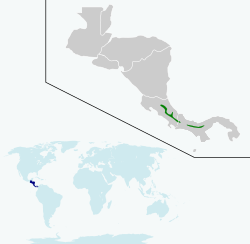| Black-cheeked warbler | |
|---|---|
 | |
| Scientific classification | |
| Kingdom: | Animalia |
| Phylum: | Chordata |
| Class: | Aves |
| Order: | Passeriformes |
| Family: | Parulidae |
| Genus: | Basileuterus |
| Species: | B. melanogenys |
| Binomial name | |
| Basileuterus melanogenys Baird, 1865 | |
 | |
| Range of B. melanogenys | |
The black-cheeked warbler (Basileuterus melanogenys) is a New World warbler, resident breeding bird endemic to the Talamancan montane forests of Costa Rica and western Panama.
It is normally found in oak forests with a dense bamboo understory from 2500 m altitude to the timberline, but occasionally occurs as low as 1600 m. The breeding pair builds a bulky domed nest with a side entrance on a sloping bank or in a gully, and the female lays two white eggs.
The black-cheeked warbler is 13–13.5 cm long and weighs 13 g. It has a rufous crown, long white supercilia and black cheeks. The upperparts are dull olive, the breast is olive-grey, and the belly is yellow-white. The sexes are similar, but the young bird is browner on the upperparts, has a dull supercilium, a greyer breast, and shows two cinnamon wingbars.
Despite this species' restricted range, it has three subspecies.
- B. m. melanogenys, the nominate race described above, breeds in central and southern Costa Rica.
- B. m. eximius is highly localised in a small area of western Panama, and is slightly whiter on the belly than melanogenys.
- B. m. bensoni is highly localised in a small area of west-central Panama, and is whiter below than eximius, and a purer grey above.
The black-cheeked warbler primarily feeds on insects, spiders and other small invertebrates, taken low in the undergrowth.
The call note of the black-cheeked warbler is a hard tsit, and the male's song is a lisping spluttered tsi tsi wee tsi tsi wu tsi wee.
